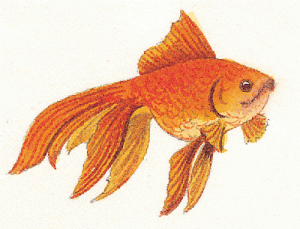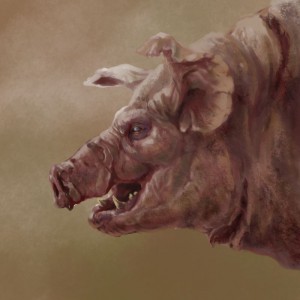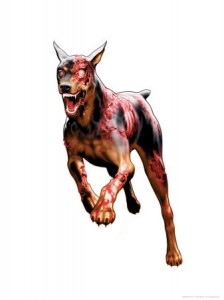Our Furry Friends: A Hidden Enemy?
 Roughly 63% of households in the United States have at least one pet. What would happen if the zombie virus jumped species? Seventy-one million homes are at risk should this happen. Sure, no one is going to run screaming if the family goldfish turns. But maybe they should. The zombie virus would mean they could “survive” out of water, and maybe give them greater powers of locomotion. Putting aside the goldfish threat for the moment, most people have larger pets, like dogs, cats, parrots, etc. Fido with the uncontrollable hunger of the undead? Totally terrifying.
Roughly 63% of households in the United States have at least one pet. What would happen if the zombie virus jumped species? Seventy-one million homes are at risk should this happen. Sure, no one is going to run screaming if the family goldfish turns. But maybe they should. The zombie virus would mean they could “survive” out of water, and maybe give them greater powers of locomotion. Putting aside the goldfish threat for the moment, most people have larger pets, like dogs, cats, parrots, etc. Fido with the uncontrollable hunger of the undead? Totally terrifying.
One of the reasons the zombie virus frightens us so much is because it strips away everything that makes a person human. In a matter of moments the virus renders a person nothing more than a ravenous animal. The question is; how would it affect creatures that are already in touch with their primal instincts?
Domesticated animals have been given human traits so that they are able to live amongst us without too many dangerous mishaps. Dogs are the perfect example of this process. In the wild, dogs (and their cousins) are pack animals. Domestication made them see humans as their pack instead of other dogs. Through time and training they adapted, learning our spoken and silent languages to fit in better. Stray dogs revert back to an all-dog pack mentality. However they still recognize humans as the dominant being in the urban forest.
If we strip away the domesticated parts of an animal, we are left with your basic wild beast. Even then they will see man as a predator and shy away from us with minimal confrontation.  In humans the zombie virus overrides the fear instinct. Take that fear of predators from an animal and there is nothing holding them back from attacking. Wild animals are outfitted with some vicious weapons. Without the fear of being hurt or possessing pain receptors to be aware of injury once turned, they will put those claws and teeth to good use.
In humans the zombie virus overrides the fear instinct. Take that fear of predators from an animal and there is nothing holding them back from attacking. Wild animals are outfitted with some vicious weapons. Without the fear of being hurt or possessing pain receptors to be aware of injury once turned, they will put those claws and teeth to good use.
For most of us, the greatest problem would come from the animals we’ve brought in to our houses as pets. Pigs, for example, will eat almost anything even without being turned. In Hannibal by Thomas Harris, there are pigs that have been trained to eat humans. It’s not unheard of for domesticated animals to eat their owners outside of novels, either. Numerous accounts have been reported of cats eating the dead when they run out of food. They do what they have to in order to survive.
 What if you lived near the local Zoo? It wouldn’t take long for an infected and crazed animal to force its way out of captivity. Images of tigers looking like the Doberman Pinschers from Resident Evil come to mind. Trust us when we say, you want to get as far away from zoos or wildlife centers after the first zombies have been found.
What if you lived near the local Zoo? It wouldn’t take long for an infected and crazed animal to force its way out of captivity. Images of tigers looking like the Doberman Pinschers from Resident Evil come to mind. Trust us when we say, you want to get as far away from zoos or wildlife centers after the first zombies have been found.
It is unclear how long it will take for the virus to jump species. However the potential for disaster is right there under our noses. If your animal is bitten while protecting the family, put it down in a humane manner. Vigilance will be what keeps the virus from crossing over sooner. Or so we hope. For all we know the virus could start with animals…
No one let that idea get further than this dispatch. We are under heavy surveillance and the UGA doesn’t need any new ideas.

…um…have all the bunnehs been removed from command?…
In the book “Feed” by Mira Grant anyhting over 40lbs could amplify the virus and convert.